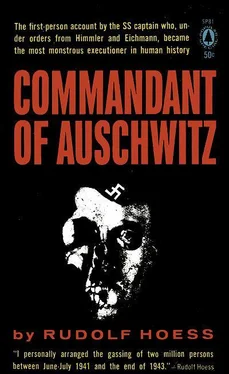As a result of his continual requests to be employed at the front, and on Kammler’s; instigation, he was given the post of commissary to Kammler’s Special Services Division from January to the middle of April 1945; it afterward became an artillery corps.
Maurer had an understanding for all matters concerning the prisoners, even though he always regarded them from the point of view of their employment as a labor force. He would never appreciate that the selection or retention of too many Jews for employment resulted directly in a deterioration in the general conditions in Auschwitz, followed by a similar deterioration in all the other camps. Yet the truth of this could not be doubted.
SS Gruppenführer Globocnik was head of the SS and police in Lublin
Shortly after the beginning of the Russian campaign, the Reichsführer SS ordered a concentration camp to be set up in Lublin. The Inspector of Concentration Camps, Glücks, took over from Globocnik the land which had been selected for this purpose, together with the beginnings of the camp, and installed Koch (hitherto commandant of Buchenwald) as its commandant. Globocnik then promised to supply Glücks with enormous quantities of blankets and sheets and footwear, and also cooking utensils and surgical instruments and medicines, for use in the concentration camp. Eventually Glücks came to Auschwitz and authorized me to go to Lublin and select the supplies that I needed. I visited Globocnik straight away, accompanied by my administrative officer, Wagner. After much dashing about, we were able to collect a certain amount of supplies that could be of use in Auschwitz. I cannot now remember of what they consisted but they included some surgical apparatus and instruments and also some medicines. At any rate the spoils were miserably small compared with the amount that Globocnik had promised. They were articles which had been requisitioned in the Lublin area and indiscriminately heaped together in a factory building.
It was during this transaction that I got to know Globocnik. He assumed a great air of importance, with his instructions from the Reichsführer SS to set up police strong points in the territories which had been taken over. He worked out fantastic plans for a series of strong points stretching to the Urals. He could see no difficulties in this, and he waved aside all objections. He wanted to destroy every Jew in this area on the spot, except those whom he needed for work on “his” police positions. He proposed to put all their property into a collecting center and utilize it for the SS. He talked about all this in his Viennese dialect in an easygoing way sitting in front of his fire in the evening, as though it were a most innocent adventure. I was rather shocked by Globocnik, who according to Glücks’s account was supposed to be extremely competent and to be held in high regard by the Reichsführer SS.
My first impressions were correct. Globocnik was a pompous busybody, whose object was to put himself in the foreground and to describe his fanciful plans as though they had to a large extent already been put into practice. It was he and only he who could get things done properly, whether it was a question of exterminating the Jews or resettling the Poles or the utilization of sequestered property. He was able to spin the most extraordinary yarns to Himmler. The latter believed him and continued to keep him, although he became unbearable and was attacked from all sides by the SD and the General Governor and the District Governor.
I do not know what led to his final dismissal. He left Lublin and went to Trieste as a senior SS and police officer. I know nothing about his activities there.
The second occasion on which I had anything to do with him was in Lublin in the spring of 1943. There had been a dispute between us over some machines and tools which he had got the local DAW (at that time subordinate to him) to deliver to the DAW at Auschwitz. He had described some ancient junk as being the most up-to-date machinery and had used the same description in his report to Pohl.
Since he had personally given orders for these swindles he did not feel very happy about it, but he dismissed the affair without comment and gave me five really modern and most urgently needed machines for the Auschwitz DAW.
My administrative officer, Möckel, had to settle accounts with his department, which had also advised Pohl that the promised equipment had either not been delivered or had been delivered only in negligible quantities. Promises were made of deliveries on a grand scale, but they came to nothing.
At that time, the chief of the SS Personnel Head Office, SS Obergruppenführer von Herff arrived in Lublin to make the acquaintance of the officers of Globocnik’s department. Globocnik took the opportunity of showing him all his model establishments. He began by getting him to inspect the large quantities of Jewish property collected in the former aircraft factory and “his” Jewish workshops where the most hopeless commodities were turned out, ranging from brushes to doormats. Everything he did was done in a way that can only be described as flashy. The Jews there, who had really organized it all, had effectively deceived Globocnik and his officers. They created as many supervisory positions as possible for themselves and then proceeded to conduct their own businesses. This was confirmed to me, later on, by Globocnik’s staff officer Höfle….
As might be expected, he regarded the Lublin concentration camp as “his” camp. He issued orders and instructions to the commandants which completely contradicted those given by the Concentration Camp Inspectorate or by Pohl. This was the cause of perpetual dissension. Globocnik, however, always managed to get his way with the Reichsführer SS by pointing out to him the special position that Lublin occupied. He hardly bothered about instructions that came from the Reich Security Head Office. He organized “his own” police actions, when it suited him. He carried out executions at his own discretion. He built labor camps for the prisoners just where he liked, without bothering in the least about Pohl or DII, for to him they were always “his” camps and “his” prisoners. In the same way he regarded Sobibor, Belzec, and Treblinka as “his” extermination centers.
Eichmann, who had known Globocnik during the time of the SS’s illegal activities prior to the invasion of Austria, was greatly bothered by him. While I spent my time arguing with Eichmann about slowing down the transports of Jews to Auschwitz, Globocnik was saying that he could not get hold of enough. He wanted to be in the forefront with “his” exterminations and “his” collections of valuables.
As his adviser on exterminations, he had SA Oberführer Oldenburg, from the Führer’s Chancellery, who before the war had devised methods of liquidating mental patients.
Among Globocnik’s extermination centers, I saw Treblinka on the same tour of inspection.
The training camp in Trawniki was also a creation of Globocnik’s. He wanted to form a separate unit of Russian guards, and had obtained the consent of the Reichsführer SS.
As might have been expected, these guards, who were called police, were unreliable. A company of them was given to me for Auschwitz. After a short time fifteen fled, taking with them all the weapons and ammunition they could lay their hands on, and during the chase that followed they engaged their pursuers with fire, which resulted in the deaths of three junior officers. All of them were recaptured, except three who managed to make their escape. The company was immediately disbanded and distributed among all the concentration camps.
His staff officer, Höfle, came to Oranienburg in 1944 and should have taken over the position of commander of a protective custody camp. In spite of the lack of suitable officers, even Glücks refused him the post. He had been too long under Globocnik’s tuition. I learned from Höfle something about Globocnik and his machinations.
Читать дальше












